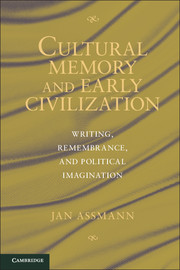7 - Greece and Disciplined Thinking
from Part II - Case Studies
Published online by Cambridge University Press: 05 June 2012
Summary
The Alphabetical Writing System
Greece is generally regarded as the prototype of a literate culture. “The first society,” write J. Goody and I. Watt, “that can truly be called literate did not evolve until the 6th and 5th centuries BCE in the city-states of Greece and Ionia.” Those who wish to study the social consequences of literacy must turn to Ancient Greece. According to I. J. Gelb, who put forward the theory that Phoenician script was a syllabary, the Greek alphabet was the first sign system to represent phonemes. This development signified a huge simplification that led to an unprecedented democratization of writing in contrast to the syllabaries of the Semites and the ideographs of the Egyptians and Chinese, which were always confined to a small, professional elite; furthermore, it had an equally unprecedented effect on the human mind. The writing-induced “domestication of the mind” (J. Goody 1968) took a gigantic leap forward with alphabetization. It was not simply writing as such but the introduction of the alphabet that led to this new intellectual “discipline” that Eric Havelock convincingly argues represented the “birth of philosophy from the spirit of writing.”
What Havelock regards as being so special about the Greek alphabet is its abstractness. A writing system that splits spoken language into the component parts (consonants and vowels) that form its units of articulation is able, with its extreme flexibility, to transcribe any and every sequence of sounds. The atomization of language through an alphabet that can break down all semantic and phonetic units allows for a reorganization of elements that will emulate the style of spoken language better than any other system of notation. The Greek alphabet was the only one that was able to reproduce the spoken word in fluent and unabbreviated form, and thus for Havelock it was a true vehicle for Greek orality.
- Type
- Chapter
- Information
- Cultural Memory and Early CivilizationWriting, Remembrance, and Political Imagination, pp. 234 - 276Publisher: Cambridge University PressPrint publication year: 2011



